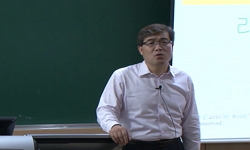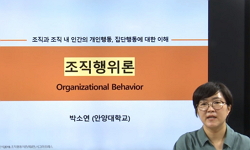본 연구는 상사의 서번트 리더십이 조직 구성원의 혁신 행동에 미치는 과정에서 구성원들의 심리적 안전감 수준의 매개 효과를 살펴보았다. 또한 서번트 리더십과 심리적 안전감 사이에서...
http://chineseinput.net/에서 pinyin(병음)방식으로 중국어를 변환할 수 있습니다.
변환된 중국어를 복사하여 사용하시면 됩니다.
- 中文 을 입력하시려면 zhongwen을 입력하시고 space를누르시면됩니다.
- 北京 을 입력하시려면 beijing을 입력하시고 space를 누르시면 됩니다.
https://www.riss.kr/link?id=A107319022
- 저자
- 발행기관
- 학술지명
- 권호사항
-
발행연도
2021
-
작성언어
Korean
- 주제어
-
등재정보
KCI등재
-
자료형태
학술저널
-
수록면
173-186(14쪽)
-
KCI 피인용횟수
6
- 제공처
-
0
상세조회 -
0
다운로드
부가정보
국문 초록 (Abstract)
본 연구는 상사의 서번트 리더십이 조직 구성원의 혁신 행동에 미치는 과정에서 구성원들의 심리적 안전감 수준의 매개 효과를 살펴보았다. 또한 서번트 리더십과 심리적 안전감 사이에서의 진정성 리더십의 조절 효과를 알아보았다. 이를 통해 상사의 서번트 리더십이 어떤 작동 기제 를 통하여 구성원의 혁신 행동을 이끌어 내는지 확인하고자 하였다. 이를 위해 온라인 설문조사를 통해 347부의 응답을 분석에 활용하였다. 각 변인들 간의 구조적 관계 모형을 설정하고 그 적합도를 확인하였다. 분석 결과, 서번트 리더십은 조직구성원의 혁신 행동을 향상시켰으며, 구성 원의 심리적 안전감은 혁신 행동을 높이는 것으로 나타났다. 또한 구성원의 심리적 안전감은 리더의 서번트 리더십이 조직 구성원의 혁신 행동 에 미치는 영향을 부분적으로 매개했다. 한편 리더의 진정성 리더십은 서번트 리더십과 구성원의 심리적 안전감 사이의 관계를 조절하였다. 즉, 진정성이 높은 서번트 리더는 조직구성원의 심리적 안전감을 증폭시키는 것으로 나타났다. 이 결과는 다음과 같이 해석될 수 있다. 서번트 리더 와 함께 일하는 구성원들은 조직 내에서 자신이 안전하다고 인식함으로써 더욱 새롭고 혁신적인 행동을 할 수 있다. 이에 더해, 구성원들이 자신 의 리더가 진정성을 지녔다고 느낀다면, 보다 더 큰 심리적 안전감을 경험한다는 것이다. 본 연구의 기여점은 다음과 같다. 첫째, 기존의 서번트 리더십과 혁신 행동과의 관계에 대한 기존의 논의들을 토대로 그 작동 기제에 대해서 보다 정교하게 논의하였다. 둘째, 서번트 리더십과 심리적 안전감의 관계에서 진정성 리더십이 중요한 역할을 한다는 것을 밝혔다. 이를 통해 조직의 리더들은 서번트 리더십과 리더의 진정성의 중요성을 이해할 필요가 있다. 위의 결과를 중심으로 본 연구의 함의와 한계점을 논의하였다.
다국어 초록 (Multilingual Abstract)
This study investigates the impact of servant leadership on the innovative behavior of employees and the mediating effect of psychological Safety and moderating effect of Authentic Leadership. Ithis paper, we tried to reveal how the servant leadership...
This study investigates the impact of servant leadership on the innovative behavior of employees and the mediating effect of psychological Safety and moderating effect of Authentic Leadership. Ithis paper, we tried to reveal how the servant leadership leads to their innovative behaviors. The analysis of this paper utilized the results of 347 individual level data through online surveys.We established a hypotheses that servant leadership may increase employee’s innovative behavior via mediating effect of psychological safety as well as moderating effect of authentic leadership. The results of correlation analysis shows that servant leadership has a positive impact on their innovative behavior, and that the psychological safety of the members has a positive impact on the Innovative behavior. In addition, the psychological safety of the members partially mediated the impact of the leader's servant leadership on the innovative behavior. The leader's authentic leadership has been confirmed to have a moderating effect that strengthens the influence of servant leadership on the psychological safety. In other words, highly authentic servant leaders have been shown to facilitate the positive effect of servant leadership on psychological safety. The implications and limitations of this study are discussed around the above results.
목차 (Table of Contents)
- 요약
- I. 서론
- II. 이론적 배경 및 연구가설
- 1. 서번트 리더십과 혁신 행동
- 2. 서번트 리더십과 심리적 안전감
- 요약
- I. 서론
- II. 이론적 배경 및 연구가설
- 1. 서번트 리더십과 혁신 행동
- 2. 서번트 리더십과 심리적 안전감
- 3. 심리적 안전감과 혁신행동
- 4. 서번트 리더십과 혁신행동 사이에서의 심리적안전감의 매개효과
- 5. 서번트 리더십과 심리적 안전감 사이에서의 진정성 리더십의 조절 효과
- III. 연구 방법론
- 1. 자료의 수집
- 2. 변수의 측정
- 3. 분석방법
- IV. 분석결과
- 1. 신뢰도 측정
- 2. 상관관계 분석
- 3. 측정모형 검증
- 4. 구조모형 검증
- 3. 구조모형
- V. 결론
- 1. 논의
- 2. 시사점
- 3. 한계점 및 제언
- 참고문헌
- Abstract
참고문헌 (Reference)
1 김일천, "혁신적 업무행동의 선행요인에 관한 연구" 한국산업경영학회 19 (19): 281-316, 2004
2 고성훈, "컴페션이 정서적 몰입과 조직 동일시에 미치는 영향 : 긍정적 업무관련정체성(PWRI)의 매개효과" 한국경영컨설팅학회 18 (18): 141-150, 2018
3 오승희, "진성리더십이 부하의 리더에 대한 신뢰와 리더와의 동일시에 미치는 영향: 집단분석수준을 중심으로" 한국경영컨설팅학회 19 (19): 1-14, 2019
4 권오영, "조직지원 인식, 윤리적 리더십, 상사 신뢰, 직무 만족간의구조적 관계 : 영업사원 관점" 한국경영컨설팅학회 18 (18): 49-59, 2018
5 김학수, "연구개발팀의 혁신성과에 대한 팀장의 변혁적 리더십 영향과 팀 심리적 안전 풍토의 조절역할에 대한 연구" 대한경영학회 26 (26): 1971-2002, 2013
6 최선규, "상사의 행동특성이 구성원의 심리적 안전감, 침묵과 친사회적 발언행동에 미치는 영향" 한국인사관리학회 36 (36): 99-123, 2012
7 오종철, "상사의 서번트 리더십이 구성원의 자기효능감, 리더신뢰 및 서비스지향성에 미치는 영향: 행정서비스 조직을 중심으로" 대한경영학회 22 (22): 1245-1268, 2009
8 Kalmi, P., "Workplace innovations and employee outcomes : Evidence from Finland" 47 (47): 430-459, 2008
9 Stone, A. G., "Transformational versus servant leadership: A difference in leader focus" 2004
10 Greenleaf, R. K., "The servant as a leader" Greenleaf Center 1970
1 김일천, "혁신적 업무행동의 선행요인에 관한 연구" 한국산업경영학회 19 (19): 281-316, 2004
2 고성훈, "컴페션이 정서적 몰입과 조직 동일시에 미치는 영향 : 긍정적 업무관련정체성(PWRI)의 매개효과" 한국경영컨설팅학회 18 (18): 141-150, 2018
3 오승희, "진성리더십이 부하의 리더에 대한 신뢰와 리더와의 동일시에 미치는 영향: 집단분석수준을 중심으로" 한국경영컨설팅학회 19 (19): 1-14, 2019
4 권오영, "조직지원 인식, 윤리적 리더십, 상사 신뢰, 직무 만족간의구조적 관계 : 영업사원 관점" 한국경영컨설팅학회 18 (18): 49-59, 2018
5 김학수, "연구개발팀의 혁신성과에 대한 팀장의 변혁적 리더십 영향과 팀 심리적 안전 풍토의 조절역할에 대한 연구" 대한경영학회 26 (26): 1971-2002, 2013
6 최선규, "상사의 행동특성이 구성원의 심리적 안전감, 침묵과 친사회적 발언행동에 미치는 영향" 한국인사관리학회 36 (36): 99-123, 2012
7 오종철, "상사의 서번트 리더십이 구성원의 자기효능감, 리더신뢰 및 서비스지향성에 미치는 영향: 행정서비스 조직을 중심으로" 대한경영학회 22 (22): 1245-1268, 2009
8 Kalmi, P., "Workplace innovations and employee outcomes : Evidence from Finland" 47 (47): 430-459, 2008
9 Stone, A. G., "Transformational versus servant leadership: A difference in leader focus" 2004
10 Greenleaf, R. K., "The servant as a leader" Greenleaf Center 1970
11 Halbesleben, J. R., "The role of continuous quality improvement and psychological safety in predicting work-arounds" 33 (33): 134-144, 2008
12 May, D. R., "The psychological conditions of meaningfulness, safety and availability and the engagement of the human spirit at work" 77 (77): 11-37, 2004
13 Deci, E. L., "The general causality orientations scale : Self-determination in personality" 19 (19): 109-134, 1985
14 Howell, J. M., "The ethics of charismatic leadership : submission or liberation?" 6 (6): 43-54, 1992
15 Kanter, R. M., "The enduring skills of change leaders" 2007
16 Garcia-Morales, V. J., "The effects of transformational leadership on organizational performance through knowledge and innovation" 19 (19): 299-319, 2008
17 Deci, E. L., "The corsini encyclopedia of psychology" 1-2, 2010
18 Schulte, M., "The coevolution of network ties and perceptions of team psychological safety" 23 (23): 564-581, 2012
19 Neider, L. L., "The authentic leadership inventory(ALI) : Development and empirical tests" 22 (22): 1146-1164, 2011
20 Beyer, J. M., "Taming and promoting charisma to change organizations" 10 (10): 307-330, 1999
21 Edmondson, A. C., "Speaking up in the operating room : How team leaders promote learning in interdisciplinary action teams" 40 (40): 1419-1452, 2003
22 Reinke, S. J., "Service before self : Towards a theory of servant-leadership" 5 (5): 30-57, 2004
23 Searle, T. P., "Servant leadership, hope, and organizational virtuousness : A framework exploring positive micro and macro behaviors and performance impact" 18 (18): 107-117, 2011
24 Liden, R. C., "Servant leadership : Development of a multidimensional measure and multi-level assessment" 19 (19): 161-117, 2008
25 Van Dierendonck, D., "Servant leadership : A review and synthesis" 37 (37): 1228-1261, 2011
26 Hunter, E. M., "Servant leaders inspire servant followers : Antecedents and outcomes for employees and the organization" 24 (24): 316-331, 2013
27 Deci, E. L., "Self-determination theory : A macrotheory of human motivation, development, and health" 49 (49): 182-, 2008
28 Barbuto Jr, J. E., "Scale development and construct clarification of servant leadership" 31 (31): 300-326, 2006
29 Walumbwa, F. O., "Retracted : Authentically leading groups : The mediating role of collective psychological capital and trust" 32 (32): 4-24, 2011
30 Neubert, M. J., "Regulatory focus as a mediator of the influence of initiating structure and servant leadership on employee behavior" 93 (93): 1220-, 2008
31 Spears, L. C., "Reflections on leadership: How Robert K. Greenleaf’s theory of servant- leadership influenced today’s top management thinkers" John Wiley 1995
32 Senge, P. M., "Reflections of leadership: How Robert K. Greenleaf’s theory of servantleadership influenced today’s top management thinkers" Wiley 217-240, 1995
33 Burris, E. R., "Quitting before leaving : the mediating effects of psychological attachment and detachment on voice" 93 (93): 912-, 2008
34 Edmondson, A. C., "Psychological safety: The history, renaissance, and future of an interpersonal construct" 1 (1): 23-43, 2014
35 Edmondson, A., "Psychological safety and learning behavior in work teams" 44 (44): 350-383, 1999
36 Kahn, W. A., "Psychological conditions of personal engagement and disengagement at work" 33 (33): 692-724, 1990
37 Liang, J., "Psychological antecedents of promotive and prohibitive voice : A two-wave examination" 55 (55): 71-92, 2012
38 Polleys, M. S., "One university's response to the anti-leadership vaccine : Developing servant leaders" 8 (8): 117-130, 2002
39 Schneider, B., "On the etiology of climates" 36 (36): 19-39, 1983
40 Nembhard, I. M., "Making it safe: The effects of leader inclusiveness and professional status on psychological safety and improvement efforts in health care teams" 27 (27): 941-966, 2006
41 Ehrhart, M. G., "Leadership and procedural justice climate as antecedents of unit-level organizational citizenship behavior" 57 (57): 61-94, 2004
42 Janssen, O., "Job demands, perceptions of effort-reward fairness and innovative work behaviour" 73 (73): 287-302, 2000
43 Yuan, F., "Innovative behavior in the workplace : The role of performance and image outcome expectations" 53 (53): 323-342, 2010
44 West, M. A., "Innovation at work: Psychological perspectives" 1989
45 King, N., "Innovation and Change in Organizations" Routledge 1995
46 Carmeli, A., "Inclusive leadership and employee involvement in creative tasks in the workplace : The mediating role of psychological safety" 22 (22): 250-260, 2010
47 Carmeli, A., "High‐quality relationships, psychological safety, and learning from failures in work organizations" 30 (30): 709-729, 2009
48 Bass, B. M., "From transactional to transformational leadership : Learning to share the vision" 18 (18): 19-31, 1990
49 Zhang, Y., "Exploring the role of psychological safety in promoting the intention to continue sharing knowledge in virtual communities" 30 (30): 425-436, 2010
50 Bass, B. M., "Ethics, character, and authentic transformational leadership behavior" 10 (10): 181-217, 1999
51 Zhao, B., "Error reporting in organizations" 31 (31): 1012-1030, 2006
52 Oldham, G. R., "Employee creativity : Personal and contextual factors at work" 39 (39): 607-634, 1996
53 Mayer, D. M., "Do servant-leaders help satisfy follower needs? An organizational justice perspective" 17 (17): 180-197, 2008
54 Scott, S. G., "Determinants of innovative behavior : A path model of individual innovation in the workplace" 37 (37): 580-607, 1994
55 Mulki, J. P., "Critical role of leadership on ethical climate and salesperson behaviors" 86 (86): 125-141, 2009
56 Martin, K. D., "Continuities and extensions of ethical climate theory : A meta-analytic review" 69 (69): 175-194, 2006
57 Schaubroeck, J., "Cognition-based and affect-based trust as mediators of leader behavior influences on team performance" 96 (96): 863-, 2011
58 Gardner, W. L., "Can you see the real me?"A self-based model of authentic leader and follower development" 16 (16): 343-372, 2005
59 Simons, T., "Behavioral integrity : The perceived alignment between managers' words and deeds as a research focus" 13 (13): 18-35, 2002
60 Ryan, R. M., "Autonomy, relatedness, and the self: Their relation to development and psychopathology"
61 Avolio, B. J., "Authentic leadership development : Getting to the root of positive forms of leadership" 16 (16): 315-338, 2005
62 Luthans, F., "Authentic leadership development" 241 : 258-, 2003
63 Yammarino, F. J., "Authentic leadership and positive organizational behavior : A meso, multi-level perspective" 19 (19): 693-707, 2008
64 Walumbwa, F. O., "Authentic leadership : Development and validation of a theory-based measure" 34 (34): 89-126, 2008
65 Hu, J., "Antecedents of teampotency and team effectiveness : An examination of goal and process clarity and servan leadership" 96 (96): 851-862, 2011
66 Graham, J. W., "An essay on organizational citizenship behavior" 4 (4): 249-270, 1991
67 Amabile, T. M., "Affect and creativity at work" 50 (50): 367-403, 2005
68 Parris, D. L., "A systematic literature review of servant leadership theory in organizational contexts" 113 (113): 377-393, 2013
69 Sidani, Y. M., "A reconceptualization of authentic leadership : Leader legitimation via follower-centered assessment of the moral dimension" 29 (29): 623-636, 2018
70 Amabile, T. M., "A model of creativity and innovation in organizations" 10 (10): 123-167, 1988
동일학술지(권/호) 다른 논문
-
중국 전기자동차 배터리 산업의 경쟁력 연구 : 한중 기업 간 비교 분석
- 한국경영컨설팅학회
- 이성용
- 2021
- KCI등재
-
공급사슬 위험관리와 위험 가시성이 유연성과 성과에 미치는 영향 : 1차 및 2차 협력업체를 중심으로
- 한국경영컨설팅학회
- 원동환
- 2021
- KCI등재
-
국내 재벌 및 가족 기업의 부채만기구조에 관한 연구 : 대리인 문제를 중심으로
- 한국경영컨설팅학회
- 박진혁
- 2021
- KCI등재
-
사회적 기업가정신 연구 : 기업의 사회적책임과 기업건전성 중심으로
- 한국경영컨설팅학회
- 조연성
- 2021
- KCI등재
분석정보
인용정보 인용지수 설명보기
학술지 이력
| 연월일 | 이력구분 | 이력상세 | 등재구분 |
|---|---|---|---|
| 2026 | 평가예정 | 재인증평가 신청대상 (재인증) | |
| 2020-01-01 | 평가 | 등재학술지 유지 (재인증) |  |
| 2017-01-01 | 평가 | 등재학술지 선정 (계속평가) |  |
| 2016-01-01 | 평가 | 등재후보학술지 유지 (계속평가) |  |
| 2015-01-01 | 평가 | 등재후보학술지 유지 (계속평가) |  |
| 2013-01-01 | 평가 | 등재후보 1차 PASS (등재후보1차) |  |
| 2011-01-01 | 평가 | 등재후보학술지 선정 (신규평가) |  |
학술지 인용정보
| 기준연도 | WOS-KCI 통합IF(2년) | KCIF(2년) | KCIF(3년) |
|---|---|---|---|
| 2016 | 0.63 | 0.63 | 0.62 |
| KCIF(4년) | KCIF(5년) | 중심성지수(3년) | 즉시성지수 |
| 0.58 | 0.56 | 0.784 | 0.06 |





 eArticle
eArticle




